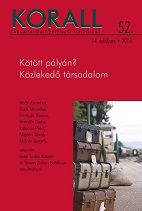Egy szocialista járműipari vállalat születése. Vállalati fejlődés a stráfkocsiktól a repülőgépeken át az önhordó karosszériás autóbuszokig
The Birth of a Socialist Vehicle Manufacturing Company: Corporate Development from Drays to Planes and Monocoque Buses
Author(s): Zsombor BódySubject(s): History
Published by: KORALL Társadalomtörténeti Egyesület
Summary/Abstract: The study discusses the history of one of the most important predecessors of Ikarus, the Uhri Brothers’ Chassis and Vehicle Manufacturing Company, from the beginning of the Second World War to the time of its nationalisation. During the industrial prosperity of the war the originally family-owned company remained a private enterprise but obtained state capital to develop its new company profile in chassis and plane manufacturing. After the war the company was involved in the war compensation transports and rebuilding works. However, unionisation, worker councils and party units (both Communist and Social Democrat) supported by the new regime meant that the private directorial position held by the Uhri family members in the company was losing ground. The state’s restrictive loan policies after the launch of the new Hungarian Forint ended the company’s inflation-stimulated boom and the company entered a difficult financial phase. Due to debts and insolvency, the family was forced to allow the state to take over the company before the general nationalisation of industries. However, divided by their association with either the Social Democratic Party or the Communist Party, there was an increasingly sharp competition for the company’s leadership between factions of the expanding state apparatus governing the country’s economy. This also divided all the company workers who belonged to either of these so-called workers’ parties. With the establishment of the one-party system, the conflict ended with the victory of the workers and organisations associated with the Hungarian Communist Party. Until a major capital investment in the 1960s, Ikarus’s manufacturing capacity, with regard to human resources and machinery, remained essentially the same as it had been established during the years of wartime prosperity. The development of the monocoque body for buses, which was the company’s impressive innovative achievement in the 1950s, was also largely based on the resources inherited from wartime investment and development.
Journal: Korall - Társadalomtörténeti folyóirat
- Issue Year: 2013
- Issue No: 52
- Page Range: 91-112
- Page Count: 22
- Language: Hungarian

